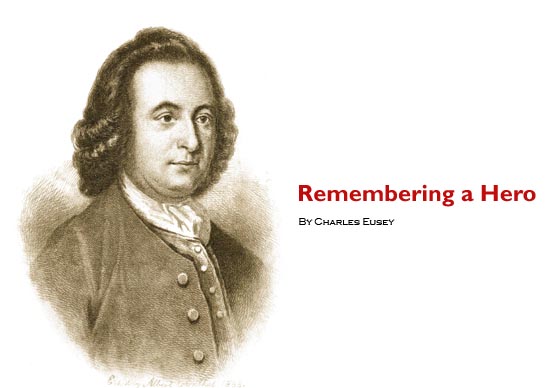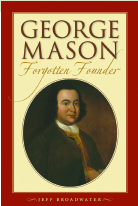Remembering a Hero
Charles J. Eusey September/October 2008
Getting your Trinity Audio player ready...

Jeff Broadwater of Barton College, Wilson, North Carolina, has sought to acquaint Americans with one of our most important founders. George Mason, in the words of Joseph Ellis, author of Founding Brothers: The Revolutionary Generation, "was the most respected founder in his own time who is virtually invisible in our time."
It is not for a lack of accomplishments that Mason has been forgotten. In 1776 he wrote most of Virginia's constitution, one of the first in this nation. He authored the Virginia Declaration of Rights, a model for the Bill of Rights. (The second paragraph of the Declaration of Independence was taken from the Virginia Declaration of Rights.) Madison's famous Memorial and Remonstrance quoted liberally from Mason's Declaration of Rights. Mason served as one of the most influential delegates to the Constitutional Convention in Philadelphia; and he initiated the movement that resulted in the first ten amendments.
Mason was a leader who did not seek for applause. He did not seek national office. He wrote no memoirs. No collection was made of his papers.
Mason feared government, because he feared a corrupt political process. He worried that the people would lose their virtue and become corrupt. But as he began to doubt the virtue of the citizens he became convinced that the republican state governments were a threat to liberty. He was fearful in 1787 that the Constitution did not protect minority interests.

|
| George Mason: Forgotten Founder by Jeff broadwater, The university of north Carolina Press, 329 pages, $34.95. |
Broadwater posits that the framers of the Constitution were committed to a separation of church and state partly because they were skeptical about the claims of the church. He quotes Gordon Wood to say, "At best most of the revolutionary gentry only passively believed in organized Christianity and, at worst, privately scorned and ridiculed it."
Mason believed that religion was a catalyst for virtue, but he did not believe in an imposed religious orthodoxy. Neither did he support an ecclesiastical establishment.
The Stamp Act protests gave Mason his first opportunity to attack slavery. His protest began with an antislavery preamble. While he did not endorse the expansion of slavery, he did not see its speedy demise. He supported a ban on the foreign slave trade and the legislation of private manumissions. His ownership of slaves and failure to free them at his death is explained in part by his desire to protect the financial interests of his nine children.
Mason's support of religious freedom was strengthened by his conviction that religious toleration had economic value. Virginia had attracted many immigrants through its relatively permissive religious climate. He also supported religious freedom for philosophical reasons. "Persecution in matters of religion serves not to extinguish, but to confirm the heresy."
The evolution of Mason's concept of religious freedom is shown in his relationship to the Anglican Church. His first draft of the Virginia Declaration of Rights provided for toleration of religious dissenters. Anglicanism, though, remained the state religion. Non-Anglicans were second-class citizens. Later he joined with Madison and Jefferson to disestablish the Anglican Church and to bar subsidies to religion.
Religious tests for office holding were included in all of the constitutions of the original colonies except for that of Virginia. In other respects the Virginia Constitution was more influential. Thirteen of Pennsylvania's 16 provisions can be traced to the Virginia Constitution. John Adams used it in Massachusetts. Even the French Declaration of the Rights of Man and of the Citizen is based on Virginia's bill of rights. It was the first bill of rights adopted by a popularly elected convention and attached to a written constitution.
During the Constitutional Convention in Philadelphia Mason was ever aware of the short-comings of a republican system. He emphasized both the possibility of majority oppression of the minority and the possibility of creating demagogues. He tried but was unable to convince the convention to add a bill of rights to the Constitution.
Broadwater is to be thanked for introducing us to the "forgotten" George Mason. In the words of H. W. Brands, author of The First American: The Life and Times of Benjamin Franklin , his "elegant and insightful study will remedy this neglect, and none too soon."
Reviewed by attorney Charles J. Eusey, Leominster, Massachusetts .